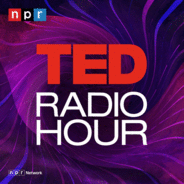Writer Anne Lamott has garnered a cult following with her shockingly honest prose on love, death, faith, writing and more. This hour, her wisdom from a career that has spanned 20 books and 40 years.TED Radio Hour+ subscribers now get access to bonus episodes, with more ideas from TED speakers and a behind the scenes look with our producers. A Plus subscription also lets you listen to regular episodes (like this one!) without sponsors. Sign-up at plus.npr.org/ted.Learn more about sponsor message choices: podcastchoices.com/adchoicesNPR Privacy Policy

Wissenschaft & Technik
TED Radio Hour Folgen
Exploring the biggest questions of our time with the help of the world's greatest thinkers. Host Manoush Zomorodi inspires us to learn more about the world, our communities, and most importantly, ourselves.Get more brainy miscellany with TED Radio Hour+. Your subscription supports the show and unlocks a sponsor-free feed. Learn more at plus.npr.org/ted
Folgen von TED Radio Hour
300 Folgen
-
Folge vom 05.04.2024Addiction, Motherhood, and Jesus with writer Anne Lamott
-
Folge vom 29.03.2024Animal Enigmas: Uncovering the mysteries of the animal kingdomOriginal broadcast date: July 14, 2023. From the bugs in our backyards to prehistoric reptiles, animal biology and behavior are full of puzzles and conundrums. On this episode, we hear from experts solving the mysteries of the animal kingdom. Guests include paleontologist Dean Lomax, biochemical engineer Saad Bhamla, herpetologist Gowri Shankar and conservation biologist Patrícia Medici. TED Radio Hour+ subscribers now get access to bonus episodes, with more ideas from TED speakers and a behind the scenes look with our producers. A Plus subscription also lets you listen to regular episodes (like this one!) without sponsors. Sign-up at: plus.npr.org/tedLearn more about sponsor message choices: podcastchoices.com/adchoicesNPR Privacy Policy
-
Folge vom 22.03.2024A More Walkable World: Ideas to get us movingWe know walking is good for our bodies, our communities, and our planet. But our car-centric cities and screen-filled lives keep us sitting. Can we change? This hour, ideas to get us moving. Guests include author Vybarr Cregan-Reid, computer historian Laine Nooney, exercise physiologist Keith Diaz, urban planner Jeff Speck, activists John Francis and Vanessa Garrison. TED Radio Hour+ subscribers now get access to bonus episodes, with more ideas from TED speakers and a behind the scenes look with our producers. A Plus subscription also lets you listen to regular episodes (like this one!) without sponsors. Sign-up at: plus.npr.org/tedLearn more about sponsor message choices: podcastchoices.com/adchoicesNPR Privacy Policy
-
Folge vom 15.03.2024Audacious SolutionsOriginal broadcast date: June 30, 2023. Big problems need audacious solutions. This hour, TED speakers use data and common sense to make laws more effective, reform the foster care system and hold environmental offenders accountable. Guests include criminal justice reform activist Sheena Meade, child welfare advocates Sixto Cancel and Marquan Teetz, and ocean monitoring expert Tony Long. TED Radio Hour+ subscribers now get access to bonus episodes, with more ideas from TED speakers and a behind the scenes look with our producers. A Plus subscription also lets you listen to regular episodes (like this one!) without sponsors. Sign-up at: plus.npr.org/tedLearn more about sponsor message choices: podcastchoices.com/adchoicesNPR Privacy Policy
